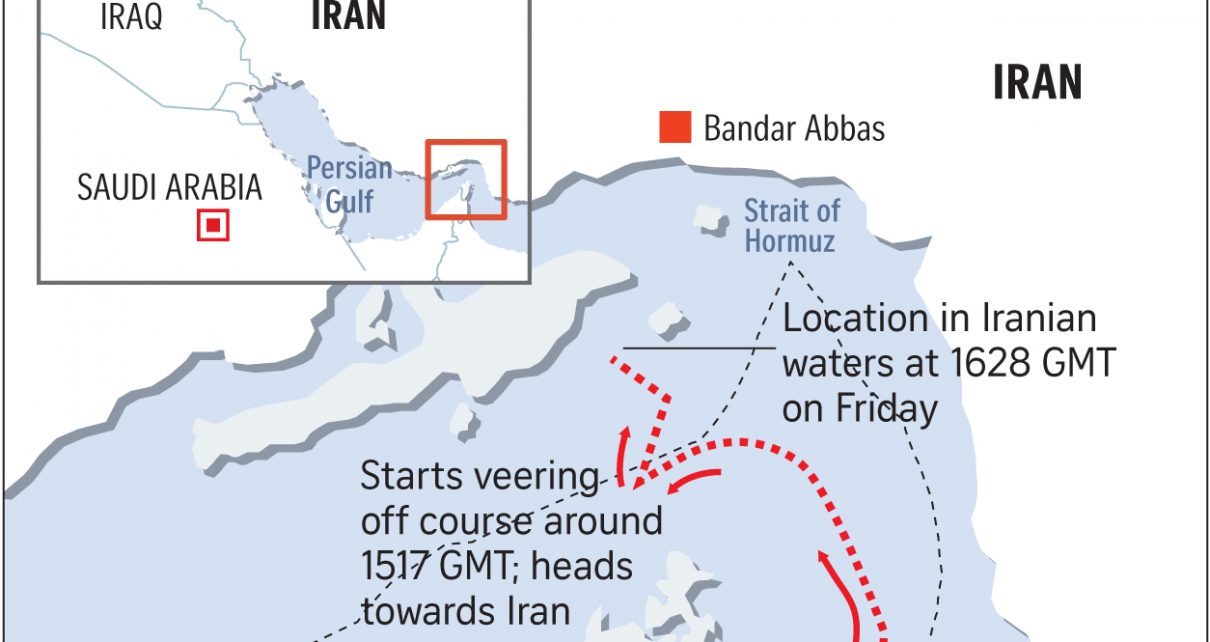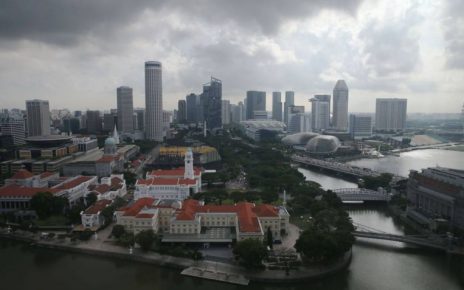TEHERAN • Iran has taken a British-flagged oil tanker seized in the Strait of Hormuz to a nearby port, Iran’s Fars news agency said yesterday, as Britain’s Foreign Secretary voiced “extreme disappointment” at Teheran’s behaviour.
In a tweet, Mr Jeremy Hunt said he had spoken to his Iranian counterpart Javad Zarif “and expressed extreme disappointment that having assured me last Sat(urday) Iran wanted to de-escalate situation, they have behaved in the opposite way”.
“This has to be about actions not words if we are to find a way through. British shipping must and will be protected,” he added.
The Foreign Office in London said it summoned Iran’s charge d’affaires Mohsen Omidzamani yesterday.
British-flagged Stena Impero was in a collision with an Iranian fishing boat whose distress call it ignored, the head of Ports and Maritime Organisation in southern Hormozgan province, Mr Allahmorad Afifipour, said.
Mr Afifipour said the vessel had been taken under the guidance of Iran’s elite Revolutionary Guards to Bandar Abbas port, situated on Iran’s southern coast and facing the strait.
“All its 23 crew members will remain on the ship until the probe is over,” he was quoted as saying.
They comprised 18 Indians, three Russians, one Filipino and a Latvian.
EXPECT ROBUST RESPONSE
Yesterday’s action in Gulf shows worrying signs Iran may be choosing a dangerous path of illegal and destabilising behaviour after Gibraltar’s legal detention of oil bound for Syria. As I said yesterday, our reaction will be considered but robust.
BRITISH FOREIGN SECRETARY JEREMY HUNT
JUSTIFIED TO RETALIATE
The rule of retaliation is something that’s recognised within international law and is used in relation to wrong measures taken by a government.
IRANIAN GUARDIAN COUNCIL SPOKESMAN ABBASALI KADKHODAEI
NOTHING BUT TROUBLE
This only goes to show what I’m saying about Iran: trouble, nothing but trouble.
U.S. PRESIDENT DONALD TRUMP
Operator Stena Bulk said on Friday that the tanker had been “in full compliance with all navigation and international regulations”, but was no longer under the crew’s control and could not be contacted.
With the seizure inflaming already fraught relations between Iran and the West, Mr Hunt earlier said he was worried that Teheran’s action had shown “worrying signs Iran may be choosing a dangerous path of illegal and destabilising behaviour”.
The incident came hours after a court in the British territory of Gibraltar extended the detention of an Iranian tanker seized two weeks ago on allegations of breaching European Union sanctions against Syria.
“Our reaction will be considered but robust. We have been trying to find a way to resolve Grace 1 issue but WILL ensure the safety of our shipping,” Mr Hunt said on Twitter.
The British navy seized Iran’s Grace 1 tanker in Gibraltar on July 4 on suspicion of oil smuggling to Syria in breach of EU sanctions.
Mr Hunt said on Friday that Britain was looking at a diplomatic solution to the issue but had warned “there will be serious consequences if the situation is not resolved”.
London yesterday warned British ships to avoid the Hormuz Strait for “an interim period” after Friday’s seizure.
Western allies backed Britain over the incident, calling for the release of the vessel and warning of the danger of escalation.
US President Donald Trump said he would hold talks with Britain about the tanker’s seizure by Iran’s Revolutionary Guards.
“And this only goes to show what I’m saying about Iran: trouble, nothing but trouble,” he told reporters at the White House.
The EU yesterday expressed its “deep concern”, saying it brought risks of deepening tensions.
The Stena Impero had been heading to a port in Saudi Arabia and suddenly changed course after passing through the strait at the mouth of the Gulf, through which a fifth of the world’s oil supplies passes.
This comes amid worsening tensions between Teheran and Washington. The US has blamed Iran for a series of attacks since mid-May on shipping around the Strait of Hormuz. Teheran rejects the allegations.
The Iranian Foreign Minister, Mr Zarif, was quoted yesterday by news agency Irna, accused Washington of creating worldwide “instability, pressure on people and increased extremism and terrorism”.
The US is sending military personnel and resources to Saudi Arabia for the first time since the US invasion of Iraq in 2003, and international concerns are growing that Washington and Teheran could blunder into a war in the strategic waterway.
Bilateral relations worsened last year when Mr Trump abandoned a 2015 nuclear deal between world powers and Iran.
Under the pact, Iran agreed to restrict nuclear work, long seen by the West as a cover for developing atomic bombs, in return for lifting sanctions. But sanctions have been imposed again, badly hurting Iran’s economy.
AGENCE FRANCE-PRESSE, DPA, REUTERS
About the situation
Tensions in the Gulf have escalated in recent months amid a deepening stand-off between Iran and United States over Teheran’s nuclear programme, with a string of incidents involving tankers and drones. Here is a look at what has been happening and why the Strait of Hormuz matters.
1 WHY IS THE STRAIT OF HORMUZ IMPORTANT?
The Strait of Hormuz is the busiest, most important waterway for the world’s oil industry. More than a third of the world’s seaborne oil passes through the strait, which connects the Persian Gulf and the Gulf of Oman and is situated between Oman and Iran. In 2016, the US Energy Information Administration estimated that 18.5 million barrels of oil passed each day through the shipping lane.
2 WHAT’S BEEN GOING ON?
Over the past several months, the US has accused Iran of attacking and harassing commercial shipping vessels on the waterway, as well as shooting down a US drone over the Persian Gulf.
In recent weeks, the US and its allies have found themselves responding in a tit-for-tat with Iran.
On July 4, British marines seized an Iranian oil tanker off the coast of Gibraltar after claiming it had violated European Union sanctions by transporting oil to Syria. Late last week, the US said it had downed an Iranian drone; Iran denied it. The events have raised concerns that the tensions could lead to military conflict.
3 WHAT IS IRAN TRYING TO ACHIEVE?
Experts said Iranian officials are trying to demonstrate to the US and its allies that the Islamic Republic is able to push back and gain leverage against the Trump administration. Washington reimposed crippling sanctions on Teheran last year after quitting a multilateral 2015 deal meant to control its nuclear drive. This has made it difficult for Iran to export oil, the foundation of the country’s economy.
4 HOW DID IT ESCALATE SO QUICKLY?
In early May, the US said it was sending an aircraft carrier strike group and a bomber task force to waters near Iran in response to “indications of a credible threat by Iranian regime forces”.
On May 12, the United Arab Emirates says four commercial oil tankers had been targeted by “acts of sabotage” in Gulf waters off its coast. Saudi Arabia says later two of its tankers suffered “significant damage” but no casualties or oil spill. The other vessels were Norwegian and Emirati. This marks the start of several months of back and forth, involving Iran, the US and its allies.
5 THE STENA IMPERO INCIDENT
Friday’s incident involved the British-flagged and Swedish owned Stena Impero, a tanker heading towards Saudi Arabia. Iran said the ship had been seized for “failing to respect international maritime rules”. The tanker has anchored off Bandar Abbas with all its 23 crew aboard: 18 Indians, one Filipino, three Russians and a Latvian.
DPA, AGENCE FRANCE-PRESSE, REUTERS



